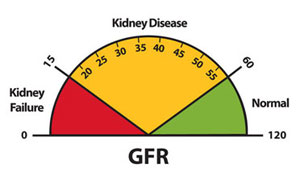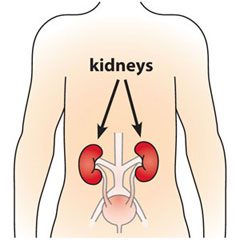
U.S. DEPARTMENT OF HEALTH AND HUMAN SERVICES
On _____________, your GFR was ___________.
Date

GFR stands for glomerular filtration rate. GFR is a measure of how well your kidneys filter blood.
On _____________, was ___________.
Date
Albumin is a protein found in the blood. A healthy kidney does not let albumin pass into the urine. A damaged kidney lets some albumin pass into the urine. The less albumin in your urine, the better.

On _____________, was ___________.
Date
Controlling your blood pressure may help to protect your kidneys.
You have two kidneys. Their main job is to filter wastes and extra water out of your blood to make urine.

Two tests are used to check for kidney disease.
You need to have your kidneys checked because you can't feel kidney disease. Kidney tests are very important for people who have diabetes, high blood pressure, or heart disease. These conditions can hurt your kidneys.
Kidney disease can be treated. The sooner you know you have kidney disease, the sooner you can get treatment to help delay or prevent kidney failure. Treating kidney disease may also help prevent heart disease.
Treatment goals are to:
What is CKD? CKD (chronic kidney disease) means the kidneys are damaged and may no longer filter blood well. This damage happens over many years. As more damage occurs, the kidneys are unable to keep the body healthy - then dialysis or a kidney transplant may be needed to maintain health.
How can I lower my risk for CKD? The steps you take to manage your diabetes and high blood pressure also help protect your kidneys. Choosing healthy foods, quitting smoking, and being more physically active are all important steps.
What are the symptoms of CKD? Most people with CKD have no symptoms until their kidneys are about to fail. The only way to know if you have kidney disease is to get tested. The sooner kidney disease is found, the sooner you can take steps to begin treatment and keep your kidneys healthier longer.
How do you check for CKD? A blood test and a urine test are used to find kidney disease. Because you are at risk, you should get these tests regularly:
Can CKD get better? CKD usually will not get better and is likely to get worse. Treatment helps slow kidney disease and keep the kidneys healthier longer.
How is CKD treated? Treatment includes keeping blood pressure at the level set by your provider, eating foods with less salt and the right amount of protein, and controlling blood sugar if you have diabetes.
Are there medications for CKD? People with CKD often take medicines to lower blood pressure, control blood sugar, and lower blood cholesterol. Two types of blood pressure medications - ACE inhibitors and ARBs - can slow CKD and delay kidney failure, even in people who do not have high blood pressure.
Will I ever need dialysis? With proper management, you may never need dialysis or, at least, not for a very long time. But if your kidneys fail, we will need to choose a treatment that can replace the job of your kidneys to maintain health. There are two types of dialysis - one is done at home daily and the other is done in a dialysis center three times a week.
Is kidney transplant an option? You may be able to receive a kidney transplant. The donated kidney can come from an anonymous donor who has recently died or from a living person. A kidney transplant is a treatment - not a cure.
For those providing diabetes self-management education, NKDEP provides a more detailed version of the key concepts for educating patients.
PDF files require Adobe Acrobat
Page last updated: August 10, 2012